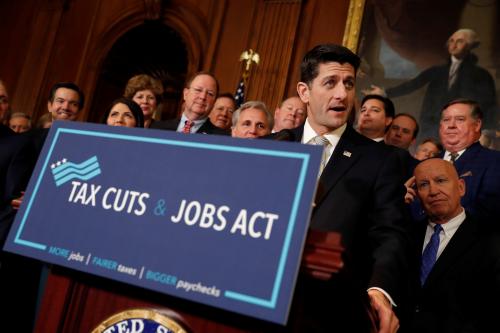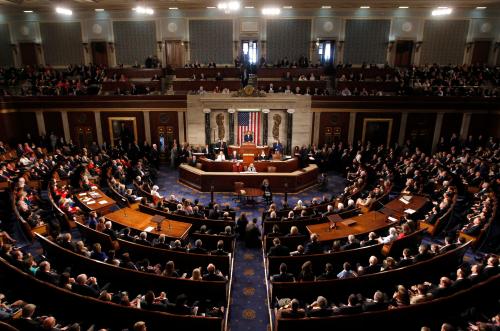At the end of each week, one of the rotating editors for Future Development—Shanta Devarajan, Wolfgang Fengler, Indermit Gill, or Homi Kharas—provides recommended literature on a specific development topic.
One of the most controversial parts of the Republican Party’s tax bill is that it reduces the corporate income tax rate from 39 percent to 21 percent (President Donald Trump would have liked to cut it to 15 percent). The common criticism is that the tax bill would reward big corporations such as Apple, General Electric, Goldman Sachs, and Pfizer with a large and permanent tax cut. This, the argument goes, would increase both budget deficits and income inequality—a double fiscal and social whammy that the United States simply can’t bear.
A careful consideration of corporate tax rates around the world and the principles of public finance might make the reader think differently. A 2010 article in The Atlantic, titled Why We Should Eliminate the Corporate Income Tax, is worth a quick look, even if you don’t read anything else that I recommend. But I hope you do read on. I’ve selected a handful of the readings that help to answer three questions: Is the U.S. corporate tax rate the highest in the world, will cutting it result in big revenue losses, and would it mean that the rich would get even richer?
Are US corporations taxed more?
Proponents of the tax cut say that the U.S. has the highest corporate income tax rate of any major economy. Here’s an excerpt from the Tax Foundation’s summary for 2017:
The United States has the fourth highest statutory corporate income tax rate among the 202 jurisdictions surveyed. The U.S. rate of 38.91 percent (comprised of the federal statutory rate of 35 percent plus an average of the corporate income taxes levied by individual states) ranks only behind the United Arab Emirates (55 percent), Comoros (50 percent), and Puerto Rico (39 percent).
The average corporate tax rate across the world is 23 percent. Because some large economies (like the U.S.) have higher rates, the average is about 29.5 percent when weighted by GDP. Europe’s average is 26 percent and China’s is 25 percent. Even India taxes its corporations less than the U.S. does.
It was not always like this. In the 1980s, after President Ronald Reagan cut the highest corporate income tax rate from 50 percent to a little less than 40, the rate in the U.S. was (briefly) lower than the average for the rest of the OECD. By the mid 1990s, other developed economies had brought their rates below that of the U.S. Today, their rates are 10 percentage points lower.
The Tax Foundation is considered “right leaning,” so you might want a second opinion. Besides, while these are the tax rates set by law, corporations also get deductions and credits that push down the actual tax rates. So do U.S. corporations actually pay higher taxes, or are they just being fussy?
The non-partisan U.S. Congressional Budget Office calculates effective corporate income tax rates for most of the G-20 (the 20 largest economies in the world, give or take). The budget office’s 2017 report confirms that in 2015, effective tax rates in the U.S. were among the highest. Though the effective rate is much lower than the statutory rates—for the U.S., the tax rate falls to 19 percent—in the G-20 only Argentina taxes corporations more than the U.S. China’s rate is 10 percent, India’s, about 15.
The loss to the Treasury
The U.S. has paid a stiff price for not matching the global decrease in corporate tax rates. Corporate income taxes add up only to about $300 billion, not chump change, but a much smaller share of federal tax revenues than in the 1970s. Some of this is because businesses have found ways to pay taxes through the income tax code—more business income is reported on individual tax returns than corporate returns. There has been a proliferation of what the Internal Revenue Service calls S-corporations. You may have heard of limited liability companies (LLCs) for example. LLCs combine the limited liability feature of corporations with the benefit of paying individual taxes, normally associated with individual-owned businesses or partnerships.
Tax revenues from corporations are also low because many U.S. multinationals choose to (legally) hold cash in other countries—an estimated $3 trillion in total. That’s as much as China’s foreign exchange reserves. If it were repatriated and taxed at the statutory rate of 38 percent or even the effective rate of 19 percent…you can do the math. This money could be used for good things like higher education, infrastructure, and defense.
The tax structure also distorts business decisions, encouraging corporations to rely too much on debt and not enough on equity. Because interest payments can be deducted while calculating corporate taxes (dividend payments are not), it makes more sense for them to keep the money abroad and borrow when they need cash. This has led politicians to accuse corporations of unpatriotic behavior. In July 2014, President Barack Obama said, to much applause:
Even as corporate profits are higher than ever, there’s a small but growing group of big corporations that are fleeing the country to get out of paying taxes… They’re keeping most of their business here. They’re keeping usually their headquarters here in the U.S. They don’t want to give up the best universities and the best military, and all the advantages of operating in the United States. They just don’t want to pay for it. So they’re technically renouncing their U.S. citizenship. They’re declaring they’re based someplace else even though most of their operations are here. Some people are calling these companies “corporate deserters.”
The facts seem to support President Obama: Just five big corporations—Microsoft, Apple, Pfizer, GE, and IBM—hold about half a trillion dollars of cash abroad. But economic reasoning doesn’t support his accusation. The duty of an executive should first be to the corporation. Greg Mankiw, an economist at Harvard University and a former chairman of the Council of Economic Advisers to the President, correctly considers their actions principled:
The great 20th-century jurist Learned Hand… expressed the principle this way: “Anyone may arrange his affairs so that his taxes shall be as low as possible; he is not bound to choose that pattern which best pays the treasury. There is not even a patriotic duty to increase one’s taxes.”
Who actually pays?
Lost in the argument is what careful economic analysis has always told us: It’s not the impact of a tax that matters; what really matters is its incidence. You have to follow the money—all the way. A big part of the tax is actually paid by the employees and customers of corporations—the folks who work for Apple, Pfizer, and GE and the people who buy smartphones, medicine, and appliances. Larry Kotlikoff of Boston University and co-authors estimate the likely sums: Cutting the corporate 35 percent tax rate to 9 percent could result in a 6-9 percent increase in wages and salaries, and a 6 percent increase in GDP. Cutting the rate to 21 percent will not help workers as much, but would bring them benefits nevertheless. Scrapping the corporate income tax and recovering the lost revenue through a value added tax (which taxes consumption, not income) might increase wages by 12-13 percent and GDP by 8 to 10 percent.
Ideally then, the U.S. should cut corporate income taxes to zero and replace them with a value added tax that has some progressive exemptions. But it is unlikely that any country that has a corporate income tax will scrap it any time soon. Only 10 economies in the world have a corporate income tax of zero, and these are tiny islands like the Caymans, Isle of Man, the Maldives, and Palau. So how should a corporate tax reform like the one being debated in Washington, D.C., be assessed?
Perhaps a corporate tax reform—maybe any tax reform—ought to be measured using two yardsticks: How much it brings tax rates into conformity with those of other economies and, by minimizing credits and exemptions, how much it reduces the gap between statutory and effective rates of taxation.
The Brookings Institution is committed to quality, independence, and impact.
We are supported by a diverse array of funders. In line with our values and policies, each Brookings publication represents the sole views of its author(s).








Commentary
Future Development Reads: How much should corporate income be taxed?
December 18, 2017